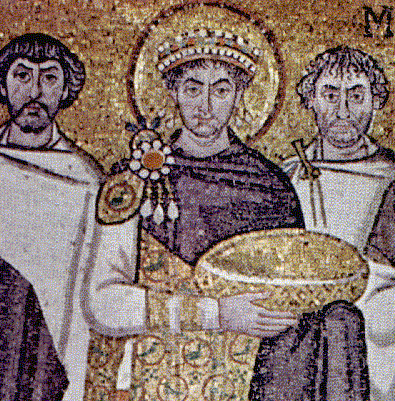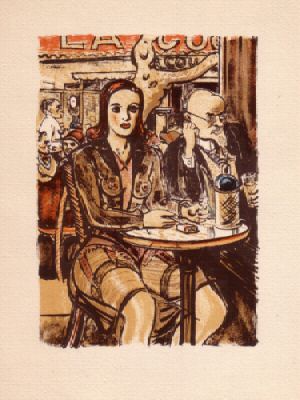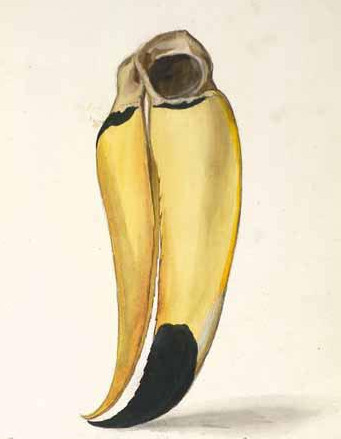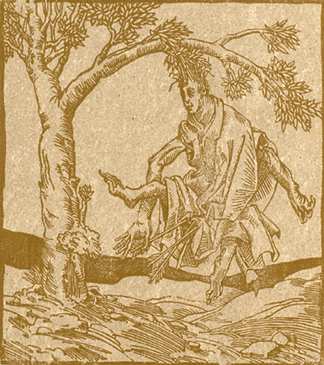Codex Ivstianvs
Why, hello. Fancy seeing you here.




Tuesday, October 31, 2006
Sunday, October 29, 2006
Worst. Congress. Ever.
Labels: politics
Read more
Friday, October 27, 2006
FCWWBDNITHBR: Quentin Compson, Part 2: Fathers and Sons

Alright, let’s try to unpack this a little bit. (I’ll fall short to the task, but it’s got to be done—just a little bit).
Back, way on back, in the ill-lit and musty damp, moth-eaten recesses of the Old Testament, King David has a son (one of many, David got around—that whore) named Absalom. And Absalom had a sister Tamar, who was raped by their half-brother, Amnon. The Bible is pretty fucked up. Absalom takes his revenge on Amnon at a banquet to which all David’s sons were invited. He flees after the murder and returns to his father’s favor only to raise a revolt at Hebron. A successful revolt, until one of David’s spies delays Absalom and David’s armies have time to prepare. And then, “A battle was fought in the ‘wood of Ephraim’ and Absalom's army was completely routed. He himself, having long hair, was caught by his hair in the boughs of an oak-tree, and as David had strictly charged his men to deal gently with the young man, Joab was informed. What a common soldier refused to do even for a thousand shekels of silver, the king's general at once undertook. Joab thrust three spears through the heart of Absalom as he struggled in the branches and his ten armour-bearers came around and slew him.” Bummer. “Absalom, Absalom!” is the cry for lost sons in conflict with their fathers—an ironic conflict born out of filial piety, real or surrogate.
His father abandons some of his liberal pieties and land-owner’s snobbery, while he becomes closer to happiness and family contentment. Quentin’s path is opposite. He looses illusions, affectations, and gains greater understanding of his family, just like Turgenev’s protagonist in Fathers and Sons. But the realizations horrify Quentin, break him apart and stamp upon his self-consciously constructed defenses. He has to leave and go to the university. It leads him to nihilism, the kind of love of nothingness found in the profound suicide. Bazarov, the other nihilist in Fathers and Sons, succumbs to typhus, but a reconciliation of sorts, a closure at his grave occurs with his parents. For his bluster, Bazarov doesn’t wish to die, and something is left. All Quentin leaves behind is a shambles, the long slow road to degeneracy chronicled in Absalom, Absalom! and The Sound and the Fury.
And what, after all, does The Sound and the Fury signify? Nothing. It is the final last gasp of a dying family, older in its infancy that the piles of woes of the whole of America because the Compsons are older than America. And they were a sorry bunch then. They possessed the upper class dinginess of all proud people gone to seed. Quentin is named after his great-great-great-great grandfather, Quentin MacLachen Compson who fled Scotland for the Carolinas after the defeat of Bonnie Prince Charlie in 1749, and his great grandfather, Governor Quentin MacLachen Compson who would be, “the last Compson who would not fail at everything he touched save longevity or suicide.” Quentin’s ancestors were defeated at every turn and came to embrace their defeats and weaknesses as gamblers, drunks, and degenerates. Even the successful, like Quentin’s grandfather, were notable for their failures (General Jason Lycurgus Compson II, son of the Governor was defeated at Shiloh). And the Compson Mile that is the heart of Quentin’s world was traded from some Chickasaw, for a race horse. No noble land grants, no Southern ideal of gentle aristocracy, it’s all a sham.
Lycurgus is name that crops up on prominent occasions in the Compson line, being the middle name of no less than four Compson men including Quentin’s father, grandfather, and brother. Failures and lost causes dominate these men, from Bonnie Prince Charlie to Shiloh to Quentin’s single year at Harvard (the Compsons can afford no more, his education is a sham of respectability). Each of them attempting to out-do their fathers’ achievements until they realize that their fathers were failures and that they themselves shall fall still deeper. Lycurgus was a Thracian king who tangled with the cult of Dionysus and was driven mad for his troubles. “Going insane, Lycurgus mistook his father Dryas for a mature trunk of ivy, which is holy to Dionysus, and killed him, pruning away his nose and ears, fingers and toes. Zeus, to whom the oak (“dryas” in Greek) is sacred, struck him blind. An oracle then predicted that the land would stay dry and barren as long as Lycurgus was alive, so his people had him dismembered by wild horses. With Lycurgus dead, Dionysus lifted the curse.”
 It is in TSatF that Quentin kills himself, succumbs, as Faulkner said, to what he loved most: death. And that is Quentin’s contribution to the family he abandons in the solitude of death, his revelation that the struggle is for naught and to merely decay is to be best in a decaying world. Quentin sees through the falsehoods of “the Southern thing” as only a believer can and he jumps off of the Charles River Bridge in Cambridge after his first year of Harvard, that his father sold some of the Compson Mile to finance. “I don’t hate it,” he says, but he walks to the river and he goes in.
It is in TSatF that Quentin kills himself, succumbs, as Faulkner said, to what he loved most: death. And that is Quentin’s contribution to the family he abandons in the solitude of death, his revelation that the struggle is for naught and to merely decay is to be best in a decaying world. Quentin sees through the falsehoods of “the Southern thing” as only a believer can and he jumps off of the Charles River Bridge in Cambridge after his first year of Harvard, that his father sold some of the Compson Mile to finance. “I don’t hate it,” he says, but he walks to the river and he goes in.Labels: FCWWBDNITHBR, literature
Read more
Friday, October 20, 2006
Oh, memories...

When I was a young punk rocker, standing at about 14 years old, I saw this album in a record store in Boulder on The Hill (Wax Trax...since closed down) and I bought it. I have, in the mean time, lost the CD, but I always remember the cover and the mighty Black Flag hardcore that it contained. The Onion AV Club did a feature today about scary album covers that jogged my memory (or "yogged" I don't know, it might be a soft "J").
So let us enjoy Black Flag and the excellent 1984 L.A. hardcore it represents. Greg Ginn on guitar, Henry Rollins on vocals. Fuck yeah.
Labels: music
Read more
Thursday, October 12, 2006
The Best Show on Television
"Which side are we on? We're on the side of the demons, Chief. We're evil men in the gardens of paradise, sent by the forces of death, to spread devastation and destruction wherever we go. I'm surprised you didn't know that."
When you see it acted out...he just made you believe in the most abhorrent ideas..because he's right/because he's wrong.
Read more
Wednesday, October 11, 2006
FCWWBDNITHBR: Quentin Compson, Part 1...Wherein we learn who this person is and by what means he met his tragic end.
Quentin Comspon:
In the last FCWWBDNITHBR I mentioned that the narrator of Moby-Dick, named Ishmael, is so-called because he is a lost son, cast out and finally cast adrift on the salty expanses of the see. Just as the Biblical Ishmael is disfavored by Abraham who turns his fatherly ambitions rather to his son by Sarah, Isaac at the direction of the God of the Covenant, so was our intrepid narrator pushed away into the ocean and finally wracked by Leviathanous Providence and can only give us his outsider’s perspective on the whole world. We have, today, with us in spirit if never true flesh, another cast aside son, another refugee from the world he was born to.
Quentin Compson (on of four so-named individuals in Faulkner’s universe) was born in 1891 and died in June 2, 1910. So he is indeed a Fictional Character Who Would Be Dead Now If [He] Had Been Real.
Quentin is fascinated a repelled at once by the sordid details of his family history as recounted to him in Absalom, Absalom! He is most attracted/repelled by his own father’s intemperance and apostasy, and his sister’s promiscuity. And he is finally disillusioned entirely when he tries to recreate his own personal and family history with his roommate at Harvard, Shreve. Upon seeing the whole picture assembled he realizes that his ideas of honor, tradition, and propriety are so much tinder for the amoral conflagration of Southern History and Compson family disgrace (his sister’s loss of virginity and eventual unwed pregnancy—the child to be named “Quentin”—serves as the focus for this feeling) the already unstable Quentin drowns himself by jumping off the Charles Bridge with his pockets weighted down.
Faulkner jumps around in time so much in his books that Quentin’s suicide doesn’t prevent him from providing the last lines of Absalom, Absalom! When asked by his roommate why he hates the South so much: “‘I don't hate it,’ Quentin said, quickly, at once, immediately; ‘I don't hate it,’ he said I don't hate it he thought, panting in the cold air, the iron New England dark: I don't. I don't! I don't hate it! I don't hate it!” Yeah…he hates it. But really he hates himself, hates his whole family, hates everything that he believed in that let him down. Graham Greene wrote that if we hadn’t been taught how to interpret the Passion beforehand, it would be easy to decide that Judas loved Jesus and it was Peter what hated the Lord. That’s how thin the line gets between Anger and Love, between Hate and Friendship. In the same way Quentin hates the South because he loves it so much. He denies the South and his feelings about it.
Quentin Compson is a much better written, and much less shallow Holden Caulfield—gifted, sensitive, loyal to his family, but ultimately troubled and lost. Just like Holden, who’s famous denouncement of the “phony” people of the world is act of a secret self-loathing engendered by the thought deep down that he himself is phony, Quentin’s relationship with the South is actually about constituting his own identity and when it falls apart he realizes that he is, himself, nothing of substance and drowns his sorrow, literally.NEXT in FCWWBDITHBR: Part 2, Wherein we examine what narrative purpose and meaning was served by the invention of Quentin Compson.
Labels: FCWWBDNITHBR, literature
Read more
Monday, October 09, 2006
Great Fucking Record
There is no earthly reason for a band to be this good.
Labels: music
Read more
Wednesday, October 04, 2006
Welcome home, your majesty.
Labels: music
Read more


